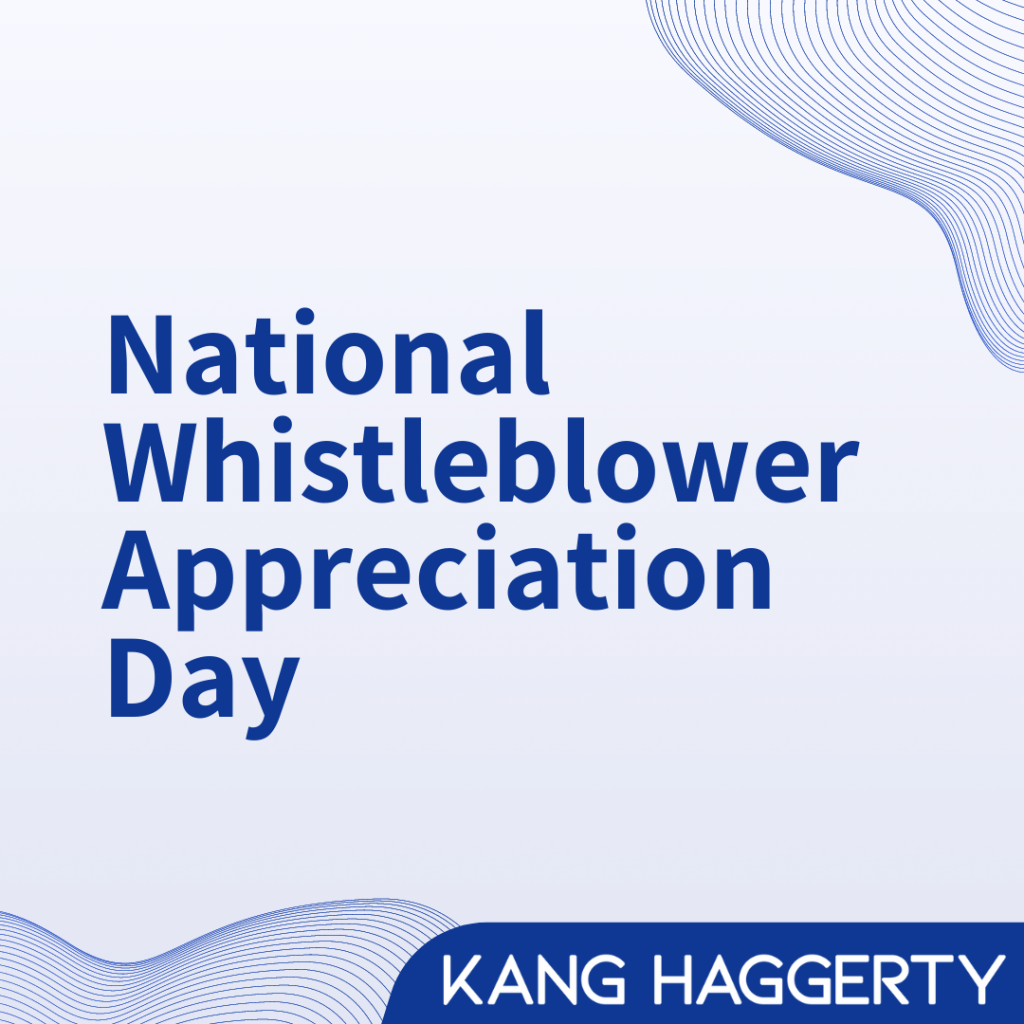 Kang Haggerty is proud to honor all whistleblowers—past, present, and future—on National Whistleblower Appreciation Day, recognized each year on July 30th to commemorate the passage of the very first U.S. whistleblower law on July 30, 1778. Continue reading ›
Kang Haggerty is proud to honor all whistleblowers—past, present, and future—on National Whistleblower Appreciation Day, recognized each year on July 30th to commemorate the passage of the very first U.S. whistleblower law on July 30, 1778. Continue reading ›
Articles Posted in Whistleblower Actions
Law360 Covers Opening of Kang Haggerty’s Whistleblower Division
Law360’s Rachel Rippetoe reported on Kang Haggerty’s formation of The Whistleblower Advocates. The article highlights the firm’s whistleblower practice, led by Edward T. Kang, Kandis L. Kovalsky, and Ross M. Wolfe. Continue reading ›
Legal Intelligencer: Nonparty Witness Invoking the Fifth Amendment Privilege in a Civil Case
Practitioners should anticipate when a witness will invoke the privilege and how to deal with or use such invocation applying the principles of fairness and reliability.
In the June 30, 2022 edition of The Legal Intelligencer, Edward T. Kang wrote “Nonparty Witness Invoking the Fifth Amendment Privilege in a Civil Case.” Continue reading ›
Legal Intelligencer: Qui Tam Suits and Veil Piercing: A Powerful Combo for Combating Health Care Fraud

This article will discuss briefly the history of qui tam litigation, its interplay with piercing theories and the particular utility of these types of suits in the health care context.
In the November 4, 2021 edition of of The Legal Intelligencer, Edward T. Kang of Kang Haggerty co-authored “Qui Tam Suits and Veil Piercing: A Powerful Combo for Combating Health Care Fraud.”
In 2019, the United States federal government spent $1.1 trillion, or approximately 25% of the overall federal budget, on just four government health care programs; Medicare, Medicaid, the Children’s Health Insurance Program (CHIP) and the Affordable Care Act (ACA). In addition to these well-known programs, the Department of Defense spends tens of billions of dollars every year providing health care to service members, veterans and their families through programs like TRICARE. Likewise, all states administer their own Medicaid programs and typically match the funding provided by the federal government, pumping even more public money into this sector. Continue reading ›
U.S. Supreme Court Clarifies the ‘First-to-File’ Rule Under the False Claims Act
In Kellogg Brown & Root Services, Inc., et al. v. United States ex rel., __, 575 U.S. __ (2015), two questions were presented before the U.S. Supreme Court: first, whether the Wartime Suspension of Limitations Act (WSLA) suspends the already generous statute of limitation under the False Claims Act (FCA); second whether the FCA’s “first-to-file” rule, which states generally that if more than one whistleblowers file the actions on the same fraud, only the first to file survives and others are dismissed, bars later filed whistleblower actions if the first filed action has been dismissed.
Reversing the Fourth Circuit Court’s decision to extend the WSLA to civil offenses, the Supreme Court unanimously held in that the WSLA only applies to criminal offenses, meaning the WSLA does not suspend the statute of limitation for an individual action brought under the FCA. The Supreme Court further held that the False Claim’s Act’s first-to-file bar applies only while related claims are active. Once the first filed case is settled or dismissed, the bar does not apply.
In 2005, the whistleblower, Carter, filed a qui tam complaint alleging that his former employer fraudulently charged the U.S. government for water purification services inadequately or fraudulently performed during the Iraq War. Nearing trial, the complaint (Carter I) was dismissed under the first-to-file rule based on an earlier filing with similar claims in United States ex rel. Thorpe v. Halliburton Co., No. 05-cv-08924 (C.D. Cal., filed Dec. 23, 2005).
Whistleblowers and their Importance to Business Success
1. What is a Whistleblower?
A whistleblower is a person who, on behalf of the federal government, state government or governmental authority, reports illegal, fraudulent or dishonest conduct by a person or an organization.
2. Importance of Internal Whistleblowers:
Counterclaim Survives in Qui Tam Whistleblower Action
A federal court in Pennsylvania recently ruled that counterclaims against the whistleblower filed by the target of a whistleblower action can survive. The United States District Court for the Eastern District of Pennsylvania, in United States of America ex rel. Lorraine Notorfransesco v. Surgical Monitoring Association, Inc., et al. (Tucker, C.J.) has denied a motion by the whistleblower, Lorraine Notorfransesco, to dismiss counterclaims made by her former employer, Surgical Monitoring Association (“SMA”). While the recent ruling seems to suggest that potential whistleblowers would be dissuaded from “blowing the whistle” for fear of being retaliated, the ruling is not exactly as controversial as it seems.
SEC Flexes Dodd-Frank Muscles for the First Time Against Employer Retaliation
The SEC has flexed its (new…ish) muscles for the first time, penalizing Paradigm Capital Management Inc. in an enforcement action for retaliation against a whistleblower.
The Dodd-Frank Act prohibits retaliation against whistleblowers, specifically providing that “No employer may discharge, demote, suspend, threaten, harass, directly or indirectly, or in any other manner discriminate against, a whistleblower” because of certain whistleblowing activities. 15 U.S.C. §78u-6(h)(1). The regulations (specifically, 17 C.F.R. §240.21F-2(b)(2)) provide for enforcement in an action brought by the SEC.
Whistleblower Expansions Continue: SOX Covers Subcontractor Employees
Whistleblower protections continue to expand with the recent U.S. Supreme Court decision in Lawson v. FMR LLC, which ruled that the anti-retaliation protection provided to whistleblowers by the Sarbanes-Oxley Act of 2002 (“SOX”) applies to employees of private companies that contract with public companies. Enactment of SOX was prompted by the collapse of Enron Corporation. In particular, §1514A(a) provides that “No [public] company . . ., or any officer, employee, contractor, subcontractor or agent of such company, may discharge, demote, suspend, threaten, harass, or discriminate against an employee in the terms and conditions of employment because of [whistleblowing activity].”
US Steps Up for Others in Whistleblower Protection
US Steps up for Others in Whistleblower Protection
 Kang Haggerty News
Kang Haggerty News

